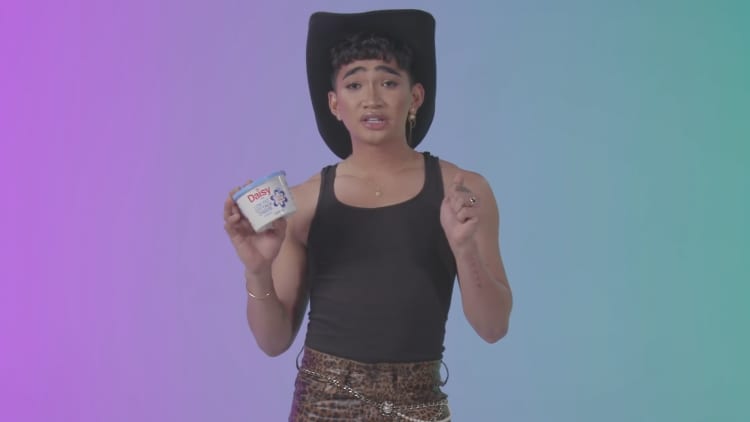Caspar Lee sits round a table at a WeWork office in London. It isn't the environment his fans would typically expect to find him in — he's not in front of a camera this time.
The British-South African YouTube vlogger is instead next to business partner Ben Jeffries. Together, the two have set up a marketing agency called Influencer, which is used by social media stars to strike brand deals with advertisers.
"It was a Tinder success story," Caspar Lee says, recalling how he matched with one of Jeffries' friends on the dating app. Lee had been dating his soon-to-be co-founder's friend for about nine months. When she told Jeffries, who at the time was already working on Influencer, he jumped at the opportunity.
"I was like, 'you have to introduce me to Caspar'," Jeffries said. And so she did, and Lee initially agreed to a 30-minute coffee. That then turned into a "three-hour creative strategy session."
"I thought, if I could connect him to the right people very quickly, he would have that stamp of approval with brands and creators that I had already been working with," said Lee, who Jeffries says co-founded and effectively helped get the project off the ground.
That was back in 2017. Fast forward to 2019, and the pair have just pulled in their first round of funding, a £3 million ($3.9 million) capital injection from London-based Puma Private Equity, with plans to take the business into the U.S. with a New York office next year.

Jeffries, who is Influencer's CEO, said the start-up now works with more than 400 brands including McDonald's and Alibaba and 6,000 influencers who have produced over 15,000 pieces of online marketing content thanks to the platform.
Regulatory questions
While it's hard to get an accurate reading on the revenues from a fledgling industry like influencer marketing, it's undeniable brands have been racing to take advantage of the trend. Influencers are now thought of as the new celebrities, attracting younger audiences that marketers crave.
As online platforms including Instagram and YouTube now collectively reach billions of users, major global brands are upping their marketing spend to ensure they can tap into the wild growth of new media. According to eMarketer, advertisers spend an average 10% of their budget on influencer marketing, while a separate report puts the industry's 2019 market value at $8 billion.
But regulatory concerns have clouded the sector of late, especially given recent controversies like the Fyre Festival, which saw celebrities like Kendall Jenner and Bella Hadid promote a bogus event billed as a glamorous music festival in the Bahamas.
Then there's the issue of a potential lack of transparency when it comes to people who are paid to promote products. In the U.K., competition and ad watchdogs have been clamping down on social media stars for not disclosing paid ads in their social media posts.
The Competition and Markets Authority (CMA) has been sending out warning letters to online celebrities it thinks may be flouting the law when it comes to disclosures, while both the CMA and the Advertising Standards Authority (ASA) have put out guidance on influencer marketing.
"We have developed specific guidance for and continue to work with the influencer community to ensure widespread understanding of our rules," a spokesperson for the ASA told CNBC. "Influencers should be upfront and clear with their followers, and our research has shown that a label like #ad is necessary as a minimum."
Jeffries sits on the board of an industry group called the Business of Influencers, which shares insights with the ASA. He said regulation "is so important for brand safety" (and, Lee adds, for "consumer safety"), because "ultimately influencer marketing isn't about disguising whether an ad is an ad."
"It's about being authentic," Jeffries said, where influencers are "promoting products and services because they actually do believe in them" rather than in exchange for a quick buck. "They should be disclosing whether an ad is an ad."
YouTube's growth
Lee began his career on YouTube back in 2010, and has since attracted a big following with over 7 million subscribers to his channel and even featured in a few movie alongside fellow U.K. vloggers KSI — real name Olajide William Olatunji — and Joe Sugg.
The platform has experienced huge growth since it was founded back in 2005, reportedly racking up 2 billion viewers a month and recently seeing two channels — Swedish creator PewDiePie and Indian record label T-Series — hit 100 million subscribers.

"It's been mind blowing," Lee said. "I've been lucky to join a market that's grown so quickly and met the right people along the way who've helped me build upon that."
Like influencer marketing, the Google-owned video sharing service hasn't been without its own share of controversy, attracting criticism in recent years — and at times losing multiple advertisers — over the placing of ads on hateful and extremist content and the algorithm-driven tailoring of video recommendations to users.
"They've got to figure out ways to allow the scalability of allowing freedom of uploading and expression," said Lee. "We do have the ability myself and creators to be in the room with them and talk about these new things they're working on."
Lee added YouTube was taking the threat of harmful content seriously. For instance, the company recently hosted an event where it opened up about its efforts to quash the "flat Earth" theory, according to the vlogger.


